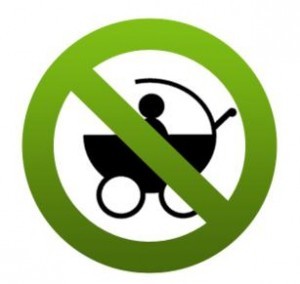There's nothing wrong with not having kids. In fact, it may be the most environmentally friendly thing to do. The planet is already overcrowded. And whether we mean to or not, every human consumes tons of resources and, in turn, produces tons of waste over the course of their lives.
Besides, there are plenty of kids in this world — who are already here — who could use good homes. In my life alone, there are several families who expanded their ranks through adoption ... and they wouldn't have it any other way.
Here's Grist.org's take on living child-free ... and their GINKy logo.
Let me get this out of the way up front: I like kids—many of them, anyway. Some of my best friends, as they say, are parents. I bear no ill will to procreators, past, present, and prospective. I claim no moral or ethical high ground.
OK, down to business
Here's the dirty little secret that we're never supposed to say in mixed company: There are a lot of perks to childfree living, not to mention a lot of green good that comes from bringing fewer beings onto a polluted and crowded planet.
Yes, as a childfree person, I'll miss out on a lot: The miracle of childbirth (though, truth be told, I don't feel so bad about skipping that one). The hilariously perceptive things that only kids say. A respectable excuse for rereading the Harry Potter series. The hope that my kid will be smarter and cooler and better looking than I ever was. More boisterous holiday celebrations. Someone to carry on the family name (assuming I won the arm-wrestling match with my partner over whose name the kid would actually get). Maybe even the satisfaction of helping a child grow into a well-educated, well-adjusted adult, and the peace of mind of knowing there's someone to take care of me in my old age.
But parents miss out on a lot too (as some will be the first to tell you): Time and emotional energy to invest in friendships and a romantic partnership. Space to focus on a career or education or avocation. Uninterrupted "grown-up" conversations. Travel that's truly impulsive or leisurely or adventurous (and never involves zoos). Unpremeditated Saturday nights on the town and Sunday brunches out. Opportunities for political or community engagement. Stretches of quiet for reading or writing or relaxing. A non-child-proofed, non-toy-strewn, non-goldfish-cracker-crumb-riddled home. Eight peaceful, uninterrupted hours of sleep a night. All without any guilt that one should be spending more quality time with the kid.
A childfree life also means a lot more financial freedom. How expensive are kids? Try $291,570 for a child born in 2008 to parents bringing home between $57,000 and $98,000 a year, according to figures from the USDA. That's for the first 18 years, so it doesn't include college. If you make more, you're likely to spend more. Couples bringing in upwards of $98,000 a year can expect to spend an average of $483,750 on a child's first 18 years. (Dig into the numbers yourself [PDF] for all the caveats and conditions.)
By choosing not to have kids, some doors are closed to you, but others are open—and they don't have sticky doorknobs.
The green angle
Here's a simple truth: For an average person like me—someone who doesn't have the ability of an Al Gore to reach millions, or of a Nancy Pelosi to advance (if not actually enact) landmark environmental legislation, or of a Van Jones to inspire (and piss off) whole new audiences—the single most meaningful contribution I can make to a cleaner, greener world is to not have children.
Read the entire Grist.org post, by Lisa Hymas, as well as outtakes from NPR's interview with Harvard psychology professor and happiness expert Daniel Gilbert and activist Stephanie Mills here.
